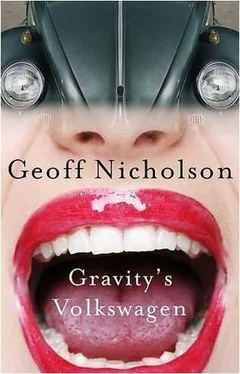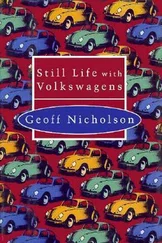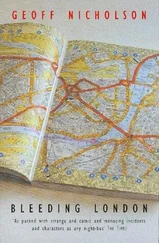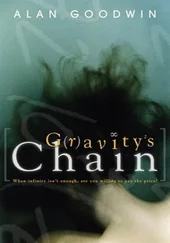Geoff Nicholson
Gravity’s Volkswagen
Ascreaming comes across the tarmac. It has happened before, often, many, many millions of times. It is the sound of an air-cooled, flat-four, horizontally opposed Volkswagen engine. It is the hammer of cylinders and exhaust gas, the whine and rattle of broad tolerances that expand and contract without the benefit of liquid coolant. It is not a pretty sound exactly, but it is ubiquitous (or was), a clattering across time and space, from 1930 s’ Germany to late-twentieth-century California to now, from factories in Wolfsburg, in Mexico and Brazil, from production lines in South Africa and Australia, in Thailand and Indonesia and Nigeria. Through deserts and swamps, across tundra and open water, it comes, solid, basic, reliable, mutable, capable of radical transformation while remaining itself, adept at absorbing punishment and meaning and grudging affection. The Love Bug. Yeah, right. World domination by any other name. The rest is rolling, moving, repeated history.
My name is Ian Blackwater and I’m a writer. I offer my apologies and I accept your commiserations. Some years ago I wrote a novel called Volkswagens and Velociraptors : you could describe it as a dystopian satire, I suppose, if that was the way you were inclined to describe things.
It was set in a devastated future when the vast majority of the world’s population had been destroyed by some terminal though non-specific catastrophe. I told myself that the very vagueness of the catastrophe gave it a timeless, resonant, poetic quality. The only survivors of the disaster, it appeared at first, were the obsessive members of a London-based Volkswagen Beetle owners’ club. They had been holding a club meeting in an underground car park when the Apocalypse struck. They were trapped in there for a good few days and that was what had allowed them to live.
Eventually these twenty or so Beetle owners and their cars emerged from the underground car park and drove out into a depopulated but largely undamaged London where they now had the complete run of the place. They got in their cars and screamed around an empty and unregulated London, doing doughnuts and handbrake turns outside the Houses of Parliament, drag racing along the Strand, pulling wheelies on the grass of Regent’s Park, playing chicken on the Westway flyover. They were happy as clams. There was no law, no speed limits, no need for tax, insurance or brakes that worked. They had all the petrol they needed, and since they were the only twenty drivers in the world, environmental pollution suddenly didn’t seem like much of a problem. They were free. Of course some of them were a bit choked up to have lost friends, families and other loved ones, but the majority of them thought this was a reasonable trade off for the automotive liberty they now enjoyed.
Things went well for a while but wouldn’t you know it, unexpected and unforeseen trouble lay ahead. Deep in the tunnels of the London Tube system something was stirring. A group of prehistoric velociraptors that had been trapped in suspended animation in the bowels of the earth for millions of years suddenly, because of the catastrophe, found themselves reanimated, alive, awake and seriously pissed off. They emerged from the tunnels and the deserted Tube stations intent on killing everything they saw.
When I began writing the book, I knew a certain amount about Volkswagen Beetles, and very little indeed about velociraptors, and obviously to an extent I chose the latter for their alliterative potential as much as anything else. So I had to do my research. Velociraptors, I discovered, were a kind of dinosaur that lived seventy to eighty million years ago, fierce, bipedal, with a sickle-shaped claw on each foot, carnivorous, growing up to seven feet long, and feathered. The name means swift thief, which I liked. And of course they made an appearance in the Stephen Spielberg movie Jurassic Park , where they were shown larger than the reality, and they certainly weren’t feathered: I guess Spielberg reckoned feathers weren’t scary enough. But frankly when a seven-foot-long carnivorous, predatory dinosaur is coming at you, I don’t think the feathers are going to be any source of comfort.
Substantial sections of my novel consisted of our heroes careening around London in their Beetles, trying desperately to escape from bands of marauding velociraptors, and occasionally mounting equally desperate, and largely useless, counterattacks. This might have gone on for ever — certainly some of the book’s reviewers said it went on far too long in my narrative — but eventually a leader emerged from among the Volkswagen folk.
The Beetle, as many people know, was the brainchild of Adolf Hitler. Before it was the People’s Car it was the KdF-Wagen, KdF standing for Kraft durch Freude, ‘strength through joy’, which was the name of a Nazi-based health and leisure movement in pre-Second World War Germany. The car played a full part in the Nazi fantasy, not least because it could be, and in due course was, easily adapted to military use, and the factories that had made Volkswagen cars subsequently made flying bombs.
And so, in Volkswagens and Velociraptors the emerging hero, a man called Troy, gradually turns into a little Hitler. He plans, he marshals his troops, he gets them to wear cool uniforms, does some small-scale Nuremberg-style displays of strength, and after many an adventure he comes up with a way to destroy the velociraptors. He succeeds. The velociraptors lose and are killed. However, when the battles are over Troy is still very much in control, talking about expanding his powers by way of a Reich that will last for a thousand years, and as it happens, the other Beetle owners are right behind him. The destruction of one race of monsters has created another.
There were a few sub plots, plenty of perverse sex, a love story and numerous digressions about the history of the Volkswagen Beetle, describing how it threw off its Nazi roots and became a genuine People’s Car, known all over the world, loved by hippies, surfers, drag racers, Mexican taxi drivers, South American dictators, and so on.
Sales of the book were ‘modest’, but in some quarters it was regularly described as a ‘cult novel’, not that I can imagine any writer worth his salt being completely happy that his work was at the centre of a cult.
In the interviews I did to publicise the novel I spent a lot of time saying this wasn’t really a science-fiction story, and that it wasn’t even really a story about Volkswagens and velociraptors, any more than Moby Dick was really a story about an aquatic mammal. I said the Volkswagen Beetle was a symbol, and then interviewers would ask, “What’s it a symbol of?” And I’d say, “Well, what do you have that needs symbolising?” And then I was accused of being a clever dick.
There was, from the beginning, a certain amount of ‘movie interest’ in the novel, which in my experience is far less exciting than you might imagine. What happens is that someone who calls himself or herself a producer comes along and gives you a surprisingly small amount of money, and this buys them the right to spend a year or so trying to ‘develop’ the project, raise some funds, pay to have a script written, perhaps get a well-known actor involved, and so on. When all this comes to nothing the rights go back to the author. As with prostitution, this isn’t such a bad deal. You’ve got it, you sell it, you’ve still got it.
The movie rights to Volkswagens and Veloci-raptors were sold almost immediately, to a bright, enthusiastic young guy from the world of British TV comedy. We had lunch. Then a year passed, nothing much happened, and the rights came back. And so it went on for the next decade or so; various interested parties came and went — producers, directors, a couple of scriptwriters, even an animator — all of them telling me they had the vision and the connections to turn my work into a movie. I never believed any of them, though I’m sure they weren’t exactly lying. They did no doubt have a vision, of sorts, and they surely did have some connections, but these were never powerful or grand enough to will the movie into being. For a little over ten years I regularly received small cheques and no movie got made.
Читать дальше












